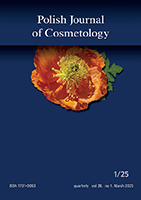search by
Copyright @ Pol J CosmetolLiposomes with nanoparticles as antimicrobial agents in acne skin care formulationAnna Herman, Marek Pieńkowski Faculty of Cosmetology, Academy of Cosmetics and Health Care, Warsaw, Poland Summary Introduction. There are some studies describing antimicrobial activity of different antimicrobial agents loaded into liposomes, nanoparticles drug delivery systems or nanoparticles-stabilized liposomes, but till now there are a lack of papers describing the antimicrobial activity of liposomes with nanoparticles (L-NPs) in the treatment of bacterial skin infection. Moreover, L-NPs may replace use of preservatives in cosmetics or pharmaceutical products for acne vulgaris skin treatment. Aim. The study was designed: 1. to compare the antimicrobial properties of L-NPs as biologically active ingredients in acne skin care formulations and 2. to examine the inhibition of microbial growth by L-NPs in O/W emulsions. Material and methods. The inhibition efficacy of L-NPs (50 ppm) was tested against microflora isolated from the acne skin volunteers and references strains. Evaluation of the antimicrobial protection of emulsions with L-NPs (5%) was performed according to the standards of the EN ISO 11930:2012. Results. All tested L-NPs incubated with skin microflora strongly inhibited bacterial and fungal growth (93-97.2%). All L-NPs inhibited the growth of S. aureus (50.8-93.4%), whereas LAg-NPs and LCu-NPs inhibited the growth of C. albicans (75%) and A. brasiliensis (67%), respectively. LAg-NPs was the most potent inhibitor of fungi growth in emulsions and meets criterion A standards. Conclusions. L-NPs have the potential of becoming effective therapeutic medication for acne. Moreover, due to their antimicrobial activity L-NPs may support the preservative systems in pharmaceutical and cosmetic products. Key words: liposome, nanoparticles, antimicrobial activity, acne treatment |




